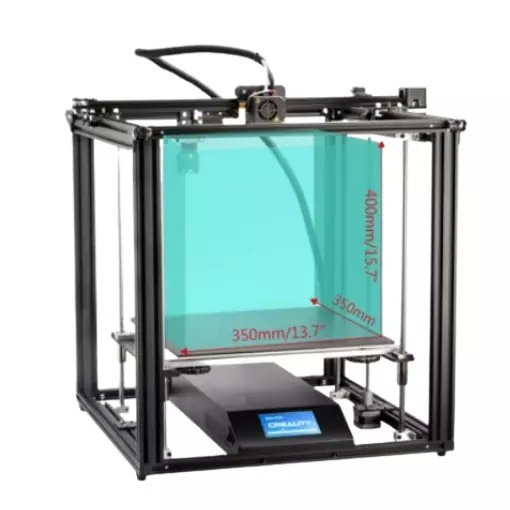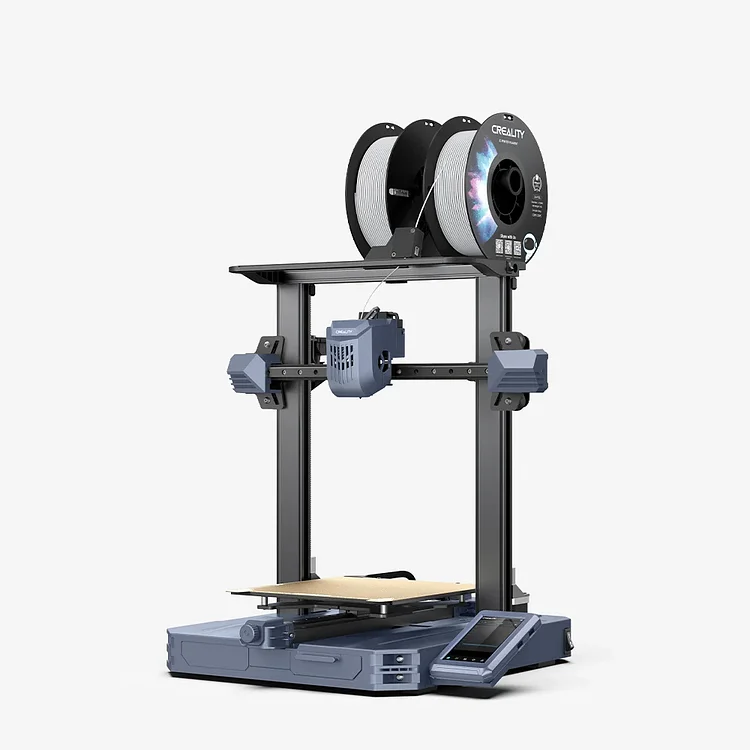Compare Ender 5 Plus vs CR10 SE
Comparison between the best 3D printers
Choose the best 3D printer at the best price. The cheapest 3D printers are here.
Buy a 3D printer here with 3D Fila.
 |
 |
|
| Model | Ender 5 Plus[BUY Ender 5 Plus] |
CR10 SE |
| Printing Material | Filament | Filament |
| Buy Filament for Creality 3D Ender 5 Plus | Buy Filament forCreality CR10 SE | |
| Estimated price | $599,00 | $386,00 |
| Manufacturer | Creality 3D | Creality |
| Release Year | 2019 | 2023 |
| Print Volume [mm] | 350x350x400 | 220x220x265 |
| Printer Size [mm] | 632x619x666 | 490x470x625 |
| Weight [kg] | 18,2 | 6,9 |
| Power Loss Recovery | YES | NO |
| Enclosed printer | NO | NO |
| Bed Leveling | Automatic | |
| Filament End Sensor | YES | NO |
| Bed type | Heated | |
| Power supply system | Bowden | Direct Drive |
| Standard nozzle | 0,4 | 0,4 |
| Maximum Nozzle Temperature [°C] | 260 | 300 |
| Maximum Bed Temperature [°C] | 100 | 110 |
| Maximum printing speed [mm/s] | 180 | 600 |
| Filament holder | YES | YES |
| Camera for supervision | NO | NO |
| Recommended filaments | PLA, TPU, ABS, PETG | PLA, PETG, PET, TPU, PA Wood, ABS, ASA, PA, PLA-CF |
| Recommended slicers | Cura, Simplify, Slic3r | Creality Print, Cura, Simplify3D, PrusaSlicer, Orca Slice |
| Maximum Resolution [mm] | 0,1 | 0,1 |
| Processor | 32 bits | |
| Display | Touchscreen TFT 4,3'' | |
| Power Supply | 24V / 504W | |
| Connectivity | SD / USB | USB, Wifi |
| Operating systems | Windows, Mac, Linux | Windows, Linux, Macbook |
| Date of registration in the system | 2021-04-14 | 2024-07-02 |
| Release date | 2019 | 2023 |
| Extra features | The Ender 5 Plus offers a large print volume (350x350x400 mm) and fast assembly. It includes a BLTouch sensor, but with range limitations. It stands out for its dimensional accuracy, although it requires adjustments to the slicer settings. Despite the noise, its integrated design saves space, and includes features such as a filament sensor and power resumption. Ideal for large projects, it requires refinement in the settings for high-quality prints. | The Creality CR10 SE stands out for its printing speed of up to 600 mm/s, easy and intuitive assembly, direct extruder with double gears, hotend with hardened steel nozzle and ceramic heater, automatic leveling with CR-Touch and pressure sensor, and use of Creality OS firmware based on Klipper, with automatic input shaping calibration. It also includes Wi-Fi connectivity, a filament out-of-stock sensor and a robust structure with linear rails on the X and Y axes. |
| Support for multiple colors and materials (AMS and CFS) | NO | NO |
Notes * |
||
| Cost-benefit | 6 / 10 | 7 / 10 |
| Hardware | 2 / 10 | 2.1 / 10 |
| Tela | . | . |
| Print volume | 4 / 10 | 3 / 10 |
| Performance | 1 / 10 | 5 / 10 |
| [BUY Ender 5 Plus] |
Conclusion |
| In comparing the **Ender 5 Plus** and the **Creality CR10 SE**, a clear differentiation emerges in terms of capabilities, features, and value for money. The **Ender 5 Plus**, while positioned at a higher price point, provides a larger print volume and several features such as automatic bed leveling, a filament end sensor, and power loss recovery. Its build quality and dimensional accuracy make it appealing for large projects, albeit with some required adjustments for optimal printing quality. However, it also has drawbacks, including a heavier weight and slower printing speed compared to its competitor. On the other hand, the **CR10 SE**, released more recently, brings the advantage of significant speed with a maximum printing speed of up to 600 mm/s. It features a user-friendly assembly process, direct drive extrusion, and smart enhancements like automatic calibration and Wi-Fi connectivity. This makes it a more versatile option, particularly appealing for those looking for efficiency and ease of use. Its ability to work with a broader range of materials also enhances its value proposition. Ultimately, the decision will depend on specific user needs. For those requiring a larger print volume and enhanced reliability, the Ender 5 Plus is a solid choice. Conversely, for users prioritizing speed, efficiency, and advanced connectivity features at a lower price, the CR10 SE stands out as an exceptional option. Therefore, both printers cater to different types of users within the 3D printing community, making the optimal choice largely dependent on individual preferences and project requirements. |

